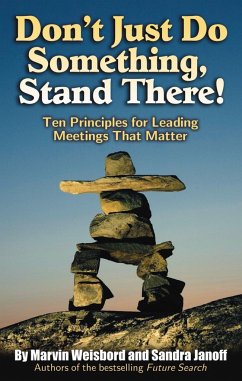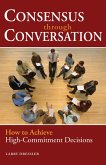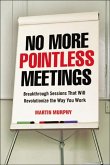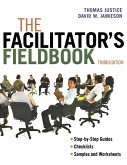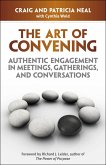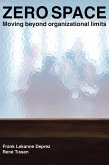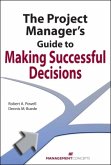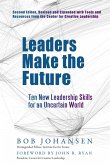This practical guide details ten key principles that will profoundly change the way you think about, organize, and lead the meetings that matter most.
Rather than trying to change anyone s behavior, Weisbord and Janoff show you how to change the conditions under which people interact. By doing less, you help others do more.
With examples from around the world, and practical tips and exercises in every chapter, Don t Just Do Something, Stand There! gives you many new techniques for helping people discover common ground, make productive use of dissension, and take responsibility for action.
Rather than trying to change anyone s behavior, Weisbord and Janoff show you how to change the conditions under which people interact. By doing less, you help others do more.
With examples from around the world, and practical tips and exercises in every chapter, Don t Just Do Something, Stand There! gives you many new techniques for helping people discover common ground, make productive use of dissension, and take responsibility for action.
Don t Just Do Something, Stand There! is an exceptional resource that renews one s faith in the utility of meetings and the positive power of effective groups. The book draws on the authors rich experience to provide practical principles for both seasoned and novice meeting leaders. If you are in search of an approach that is task- focused, makes full use of everyone s experience and expertise, and generates collaborative actions that people will be inspired to implement, this book is for you.
Joanne Burke, Coordinator, UN Capacity for Disaster Risk Reduction Initiative (CADRI), UNDP/BCPR
Gaining agreement on values and goals among members of our worldwide organization is critical to our continued success. Weisbord and Janoff s skillful facilitation helped us achieve a level of common understanding in three days that otherwise could have taken us years.
Dick Haworth, Chairman of the Board, Haworth, Inc.
Weisbord and Janoff s exemplary principles for facilitating group process have helped us create the space where individuals can take responsibility for their learning and act upon the decisions they make.
Deborah B. Reeve, EdD, Deputy Executive Director, National Association of Elementary School Principal
I have worked with Weisbord and Janoff s principles as Secretary of Corrections in Nebraska and in Washington State. They helped us establish a direction that staff could embrace and rally behind. They facilitated our very diverse perspectives and enabled both agencies to develop vision points that have guided us well into the future.
Harold W. Clarke, Secretary, Washington Department of Corrections
Facilitating the training of new student leaders each year, I have replaced traditional leadership lectures with meetings building on the students dreams and plans. Weisbord and Janoff s principles have given me the hope that I had lost in countless sessions of strategic planning. Now I have a way that to my mind can effectively change our school for the better.
Pieter Booysen, Principal, Afrikaans High School, Randburg, Gauteng, South Africa.
If only every facilitator worked like this, we would all sign up to attend meetings rather than avoid them!
Judy Schector, Director, Developing Leadership In Reducing Substance Abuse, A Program of The Robert Wood Johnson Foundation
Three years of applying these principles have paid off. We began our initiative as a motley collection of activists. Now, we re a growing community network, producing significant results on sustainability issues.
Ralph Copleman, Director, Sustainable Lawrence, NJ
Applying these principles has greatly influenced my practice with groups both large and small. In today s world of multiple view- points and continuous change, leading meetings this way has been quite liberating. It allows groups to act together on what they care deeply about.
John Goss, Cinnabar, Johannesburg, South Africa.
I learned that I could be a much more effective facilitator if I let the groups do their own work. This meant that I had to change my style, contain the anxiety I felt about them not getting where they should be or not doing it right, and allow groups to self manage.
Joy Humphreys, thehumphreysgroup, Elsternwick, Victoria, Australia
I have been practicing the stand back approach ever since I at- tended your program in Philadelphia. Left to my own devices, I would never have found this option. Now it s a safety net, and I feel able to rely on it.
Dick Stockford, Director of Strategic Positioning, Ltd, United Kingdom
I ve talked with my Australian friends before writing these words. Marvin and Sandra have touched something profound and authentic in many of us. Somehow the way they just stand there creates a space like no other we ve known. With them we have experienced a way of leading that allows for confrontation and safety, and tension and relief. There s no pretense, no hidden agenda, no shred of manipulation; And in their new book they double our good fortune by shar- ing what they do.
Tony Richardson, Councilman, Tasmanian Government
My first exposure to Marv and Sandra s ten principles was in meetings I led in Inuit communities in the high Arctic a land of sudden and violent winter storms that obliterate familiar reference points and change landscapes. For the traveler caught in a storm an Inukshuk inspires confidence and shows the way. These principles, like the Inukshuk, will bring a sense of hope for folks trying to find their way through the confusing world of organizational change.
Mike Bell, Inukshuk Management Consultants
The principles in this book are widely applicable to many kinds of meetings, not only in the US, but also around the world. I liken using these principles to a swan! Doing less on the water s surface, and managing its own internal mental processes below the surface.
Kazuhiko Nakamura, Associate Professor, Nanzan University, Nagoya, Japan
The special gifts Weisbord and Janoff offer are structures and guidelines that free us to be responsible in creating meetings that matter . . . A refreshing antidote to meetings in which leaders and experts tell us what they want us to know and do.
Barry Oshry, author of Seeing Systems: Unlocking the Mysteries of Organizational Life, and Leading Systems: Lessons from the Power Lab
When I began to apply these principles, I experienced a substantial shift in my role. The less front and center I became as the consultant, the more effective I became as a change agent. The more I tended the process from a base of core principles, the greater the value my presence offered.
Shem Cohen, Cohen Consulting, Albany, NY
My author-colleagues have done it again, this time for making meet- ings of all kinds productive. Recipe? A steady focus on intended OUTCOMES, making sure that all the right people are in the room, on an equal footing, relying on their own experiences. In this frame- work, leaders stay out of the way as good things emerge, a practice requiring understanding and discipline. This book helps you gain both.
Rolf Lynton, PhD, long-term consultant to creative organizations in South and East Asia; emeritus professor; and author of the bestselling Training for Development
Blending the ideas of administration and teaching staff with the ideas of parents, students, and non-teaching staff is a somewhat radical notion in the world of schooling...one whose time has come!
Chris Kingsberry, educational consultant, Philadelphia, PA
I am grateful for the profound simplicity of these principles. In every engagement I now ask myself 1. Have all of the stakeholders been invited? 2. Are all of the voices being heard? 3. Are we working toward the future with an emphasis on
common ground? 4. Have we considered all the aspects of the situation, including
the past and the present? And, 5. What and how much can each participant manage so I can get out of the way?
Jean Katz, Jean Katz Consulting, Los Angeles, CA
Marv and Sandra s approach allows for deeper and clearer exploration of differences in a respectful and open manner. However, don t be fooled, it isn t easy. I have experienced the way in which I can change my behavior, my thinking, and my emotional state, to engage with others so we all move forward together.
Glen Barnes, Director, Breakthrough Consulting P/L, UK
Over the years I have switched from the expert solving problems to bringing out what people are ready, willing, and able to do. This is a radically different stance. A colleague noticed and said, If you are helping them do what they are ready, willing and able to do, how will they know we are providing valuable services? I replied that our value isn t in what we are doing, but in what the client is doing. That would be all the proof necessary.
Rick Lent, Brownfield Lent Consulting, Stow, MA
Valuing structure over controlling behavior is stunning. The seem- ing simplicity reminds me of a time when I was at Polaroid when we were developing a new state-of-the-art camera. It had only one fas- tener. All 140 parts snapped together. Some people said that it must be a cheap camera because it only had one screw. Those of us in- volved realized that it took incredibly creative thinking and technology. Weisbord and Janoff s insights have made something that seems so simple be so elegantly useful.
Manny Elkind, Mindtech, Inc., Sharon, MA
Marv and Sandra have taught me to work with group process in a profoundly different way. I ve learned how to, just stand there in a way that is productive for the group and not threatening to me. I ve learned the extraordinary value of helping groups differentiate AND integrate their perspectives by finding allies in the room; and what I learned about myself in the process has been invaluable.
Gale S. Wood, COMET Consulting & Coaching, Havertown, PA
The way of leading meetings has informed our core practices and, even more than that, had reinforced my level of trust in the wisdom of a large and very diverse system.
Ruth McCambridge, Editor in Chief, The Nonprofit Quarterly
Marv and Sandra helped us understand that as facilitators we are not there to fix problems. We run the process, the group provides the content and self manages its work. Groups feel safer, enjoy them- selves, and are much more productive.
Bob Campbell and Lynda Jones, Groupwork, Pty Ltd, Launceston, Tasmania, Australia
By the summer of 2000 we knew that without important changes, air traffic, rife with parochialism, would grind to a halt. We chose Marv and Sandra to help us with the challenge. Working with the whole system in the room enabled a significant decision, giving the FAA s Air Traffic Command Center the latitude to put a decades- old practice first come, first served on the back burner whenever the system was stressed beyond capacity. We made magic in that meeting. This result was previously thought impossible.
Jack Kies, Metron Aviation, Inc., Former Program Manager for Air Traffic Tactical Operations, Federal Aviation Administration
Joanne Burke, Coordinator, UN Capacity for Disaster Risk Reduction Initiative (CADRI), UNDP/BCPR
Gaining agreement on values and goals among members of our worldwide organization is critical to our continued success. Weisbord and Janoff s skillful facilitation helped us achieve a level of common understanding in three days that otherwise could have taken us years.
Dick Haworth, Chairman of the Board, Haworth, Inc.
Weisbord and Janoff s exemplary principles for facilitating group process have helped us create the space where individuals can take responsibility for their learning and act upon the decisions they make.
Deborah B. Reeve, EdD, Deputy Executive Director, National Association of Elementary School Principal
I have worked with Weisbord and Janoff s principles as Secretary of Corrections in Nebraska and in Washington State. They helped us establish a direction that staff could embrace and rally behind. They facilitated our very diverse perspectives and enabled both agencies to develop vision points that have guided us well into the future.
Harold W. Clarke, Secretary, Washington Department of Corrections
Facilitating the training of new student leaders each year, I have replaced traditional leadership lectures with meetings building on the students dreams and plans. Weisbord and Janoff s principles have given me the hope that I had lost in countless sessions of strategic planning. Now I have a way that to my mind can effectively change our school for the better.
Pieter Booysen, Principal, Afrikaans High School, Randburg, Gauteng, South Africa.
If only every facilitator worked like this, we would all sign up to attend meetings rather than avoid them!
Judy Schector, Director, Developing Leadership In Reducing Substance Abuse, A Program of The Robert Wood Johnson Foundation
Three years of applying these principles have paid off. We began our initiative as a motley collection of activists. Now, we re a growing community network, producing significant results on sustainability issues.
Ralph Copleman, Director, Sustainable Lawrence, NJ
Applying these principles has greatly influenced my practice with groups both large and small. In today s world of multiple view- points and continuous change, leading meetings this way has been quite liberating. It allows groups to act together on what they care deeply about.
John Goss, Cinnabar, Johannesburg, South Africa.
I learned that I could be a much more effective facilitator if I let the groups do their own work. This meant that I had to change my style, contain the anxiety I felt about them not getting where they should be or not doing it right, and allow groups to self manage.
Joy Humphreys, thehumphreysgroup, Elsternwick, Victoria, Australia
I have been practicing the stand back approach ever since I at- tended your program in Philadelphia. Left to my own devices, I would never have found this option. Now it s a safety net, and I feel able to rely on it.
Dick Stockford, Director of Strategic Positioning, Ltd, United Kingdom
I ve talked with my Australian friends before writing these words. Marvin and Sandra have touched something profound and authentic in many of us. Somehow the way they just stand there creates a space like no other we ve known. With them we have experienced a way of leading that allows for confrontation and safety, and tension and relief. There s no pretense, no hidden agenda, no shred of manipulation; And in their new book they double our good fortune by shar- ing what they do.
Tony Richardson, Councilman, Tasmanian Government
My first exposure to Marv and Sandra s ten principles was in meetings I led in Inuit communities in the high Arctic a land of sudden and violent winter storms that obliterate familiar reference points and change landscapes. For the traveler caught in a storm an Inukshuk inspires confidence and shows the way. These principles, like the Inukshuk, will bring a sense of hope for folks trying to find their way through the confusing world of organizational change.
Mike Bell, Inukshuk Management Consultants
The principles in this book are widely applicable to many kinds of meetings, not only in the US, but also around the world. I liken using these principles to a swan! Doing less on the water s surface, and managing its own internal mental processes below the surface.
Kazuhiko Nakamura, Associate Professor, Nanzan University, Nagoya, Japan
The special gifts Weisbord and Janoff offer are structures and guidelines that free us to be responsible in creating meetings that matter . . . A refreshing antidote to meetings in which leaders and experts tell us what they want us to know and do.
Barry Oshry, author of Seeing Systems: Unlocking the Mysteries of Organizational Life, and Leading Systems: Lessons from the Power Lab
When I began to apply these principles, I experienced a substantial shift in my role. The less front and center I became as the consultant, the more effective I became as a change agent. The more I tended the process from a base of core principles, the greater the value my presence offered.
Shem Cohen, Cohen Consulting, Albany, NY
My author-colleagues have done it again, this time for making meet- ings of all kinds productive. Recipe? A steady focus on intended OUTCOMES, making sure that all the right people are in the room, on an equal footing, relying on their own experiences. In this frame- work, leaders stay out of the way as good things emerge, a practice requiring understanding and discipline. This book helps you gain both.
Rolf Lynton, PhD, long-term consultant to creative organizations in South and East Asia; emeritus professor; and author of the bestselling Training for Development
Blending the ideas of administration and teaching staff with the ideas of parents, students, and non-teaching staff is a somewhat radical notion in the world of schooling...one whose time has come!
Chris Kingsberry, educational consultant, Philadelphia, PA
I am grateful for the profound simplicity of these principles. In every engagement I now ask myself 1. Have all of the stakeholders been invited? 2. Are all of the voices being heard? 3. Are we working toward the future with an emphasis on
common ground? 4. Have we considered all the aspects of the situation, including
the past and the present? And, 5. What and how much can each participant manage so I can get out of the way?
Jean Katz, Jean Katz Consulting, Los Angeles, CA
Marv and Sandra s approach allows for deeper and clearer exploration of differences in a respectful and open manner. However, don t be fooled, it isn t easy. I have experienced the way in which I can change my behavior, my thinking, and my emotional state, to engage with others so we all move forward together.
Glen Barnes, Director, Breakthrough Consulting P/L, UK
Over the years I have switched from the expert solving problems to bringing out what people are ready, willing, and able to do. This is a radically different stance. A colleague noticed and said, If you are helping them do what they are ready, willing and able to do, how will they know we are providing valuable services? I replied that our value isn t in what we are doing, but in what the client is doing. That would be all the proof necessary.
Rick Lent, Brownfield Lent Consulting, Stow, MA
Valuing structure over controlling behavior is stunning. The seem- ing simplicity reminds me of a time when I was at Polaroid when we were developing a new state-of-the-art camera. It had only one fas- tener. All 140 parts snapped together. Some people said that it must be a cheap camera because it only had one screw. Those of us in- volved realized that it took incredibly creative thinking and technology. Weisbord and Janoff s insights have made something that seems so simple be so elegantly useful.
Manny Elkind, Mindtech, Inc., Sharon, MA
Marv and Sandra have taught me to work with group process in a profoundly different way. I ve learned how to, just stand there in a way that is productive for the group and not threatening to me. I ve learned the extraordinary value of helping groups differentiate AND integrate their perspectives by finding allies in the room; and what I learned about myself in the process has been invaluable.
Gale S. Wood, COMET Consulting & Coaching, Havertown, PA
The way of leading meetings has informed our core practices and, even more than that, had reinforced my level of trust in the wisdom of a large and very diverse system.
Ruth McCambridge, Editor in Chief, The Nonprofit Quarterly
Marv and Sandra helped us understand that as facilitators we are not there to fix problems. We run the process, the group provides the content and self manages its work. Groups feel safer, enjoy them- selves, and are much more productive.
Bob Campbell and Lynda Jones, Groupwork, Pty Ltd, Launceston, Tasmania, Australia
By the summer of 2000 we knew that without important changes, air traffic, rife with parochialism, would grind to a halt. We chose Marv and Sandra to help us with the challenge. Working with the whole system in the room enabled a significant decision, giving the FAA s Air Traffic Command Center the latitude to put a decades- old practice first come, first served on the back burner whenever the system was stressed beyond capacity. We made magic in that meeting. This result was previously thought impossible.
Jack Kies, Metron Aviation, Inc., Former Program Manager for Air Traffic Tactical Operations, Federal Aviation Administration

